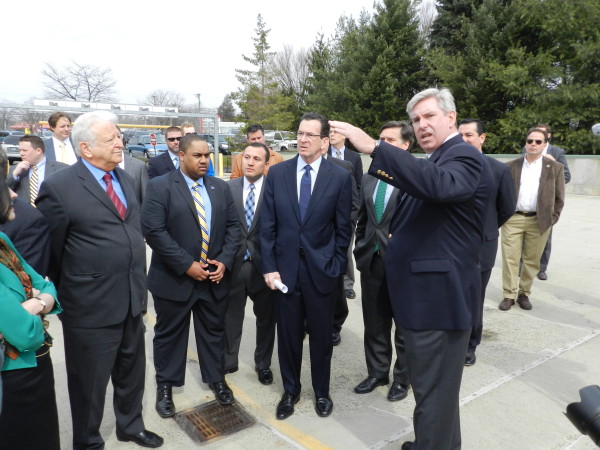A state-backed program that enables property owners to obtain private capital to finance energy upgrades and then pay off the debt over time through their tax bills is poised to take off after launching in January.
A shopping mall at 542 Westport Ave. in Norwalk owned by Elite Development Group L.L.C. recently became the first project in the state to obtain financing through the Connecticut Property Assessed Clean Energy (C-PACE) program.

Now, at least 90 projects are in the pipeline and awaiting approval, said Genevieve Sherman, manager of the C-PACE program for the Connecticut Clean Energy Finance and Investment Authority (CEFIA).
“We look at every project coming in and do a technical underwriting process on the project so we can make sure the … projected (energy) savings can be confidently achieved,” Sherman said. “We feel we”™ve developed one of the most robust, transparent underwriting policies in the country.”
The C-PACE program represents a unique public-private partnership that allows commercial property owners to pay off loans obtained for certain energy efficiency and renewable energy upgrades through a voluntary municipal property tax assessment.
Dan Esty, commissioner of the Connecticut Department of Energy and Environmental Protection, said the C-PACE program embraces the reality that “we are in an era of limited government capacity and funding.”
“The only way we”™re going to make progress is to use our limited government funds to leverage private capital,” said Esty, who was joined April 1 at 542 Westport Ave. by Gov. Dannel P. Malloy and other public officials.
Malloy was even more blunt.
“It”™s very important … to bring about cleaner, cheaper and more reliable energy in the state of Connecticut,” Malloy said. “We”™re too expensive in this state. It”™s hurting us on a competitive basis, whether it”™s in manufacturing or office complexes or retail complexes.”
For energy upgrades that come with high up-front costs, the process of obtaining financing “really revolves around the revenues that are generated from the investment,” Sherman said.
Sherman said lenders often hesitate to extend credit for energy projects, fearing that the savings won”™t materialize and that loans will fall into default.
“So we”™ve built a really robust program structure for C-PACE because we”™re bringing in commercial lenders and they want those risks to be mitigated as much as possible,” she said.
CEFIA acts as program administrator and as the legal and technical middleman for projects financed through C-PACE, ensuring that they will deliver the projected savings. Municipalities act as payment conduit, forwarding property tax revenues to CEFIA, which in turn repays the initial investor.
“These benefit assessments work like any other municipal assessment ”” they have a senior position to the mortgage on the property and they use the building as collateral,” Sherman said. “So it”™s a very secure payment mechanism and it provides commercial lenders a high level of security.”
Even if a property is sold or the deed is transferred, the assessment remains until the loan is paid off.
Municipalities have a say in allowing developers in their towns to finance projects through C-PACE. Norwalk was the first to do so, and at least 20 towns and cities across the state have followed, including Bridgeport, Greenwich, Stamford, Stratford, Westport and Wilton.
The project at 542 Westport Ave. involves the installation of an array of solar photovoltaic panels, lighting upgrades and other improvements, said Robert W. Hartt, managing member of Hartt Realty Advisors L.L.C., which operates the mall.
The solar panel system will be installed by Sound Solar Systems L.L.C. of Old Greenwich.
Asked whether the upgrades would”™ve happened without C-PACE, Hartt said, “Not in a million years.”
When Hartt Realty and Elite Development initially pitched a plan to their lenders to finance the improvements through C-PACE, “They said they”™d never heard of C-PACE,” Hartt said.
“Within two weeks, though, I got the notification letter back from the lender, signed, and with no questions,” Hartt said. “I do think that CEFIA and the process they have in putting the whole package together for the lender adds a lot of credibility.”




















Comments 2